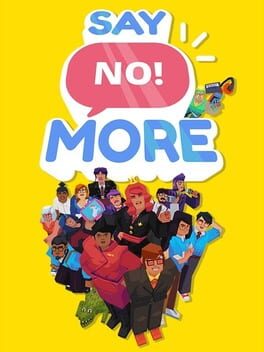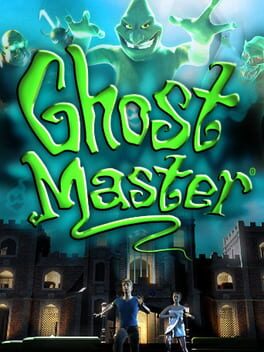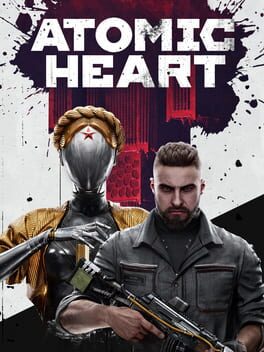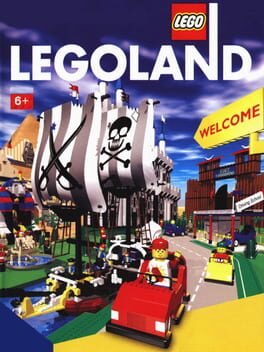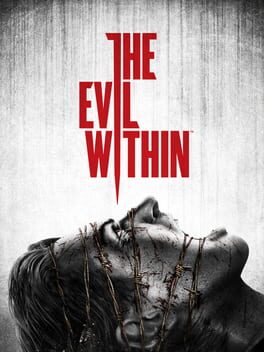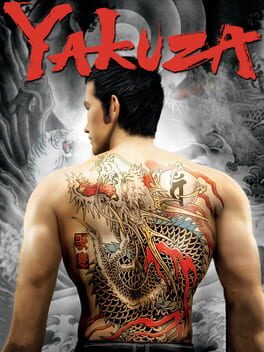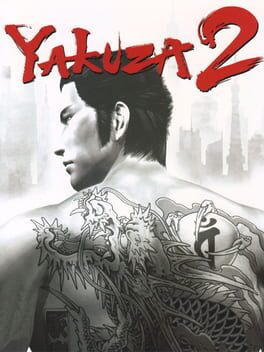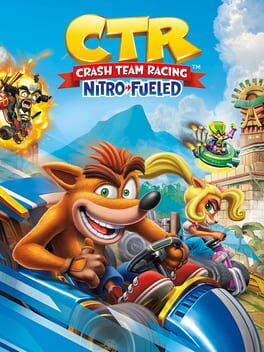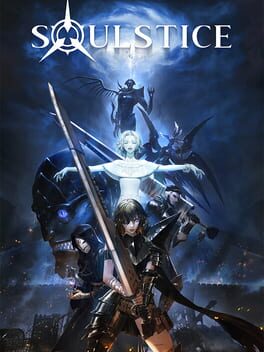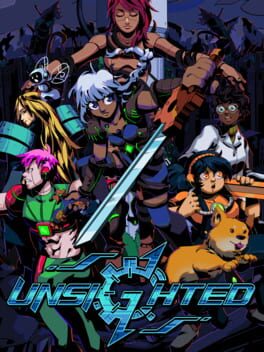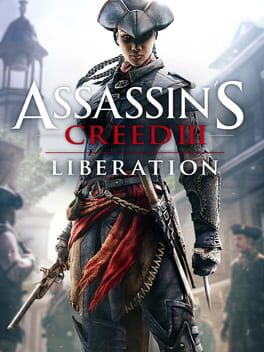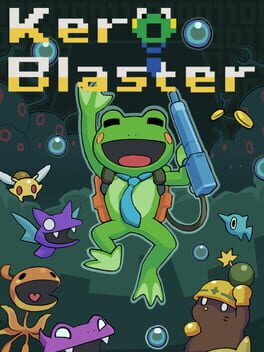Onilux
157 Reviews liked by Onilux
Say No! More
2021
A mechanically hollow on-rails comedy game with a rather milquetoast anti-capitalist message wrapped around it. A by-product of the Screenshot Saturday Syndrome and it shows - there is so much wasted potential in it's No-ism mechanic and making it more engaging to the player, but instead it really just boils down to pressing a button and adding a bit of flare here and there. It's infuriating to see how much of the "game" inside here is so undercooked and surface-level, yet everything around has so much production, effort and polish put into it. Cute character customization, Multi-language "No" support (that persists in all of it's UI), FULLY VOICE ACTED (though that german-english v/o is breaking my heart to hear please stop) and excellent presentation all cannot carry the burden of a hollow core.
Ghost Master
2003
Atomic Heart
2023
Legoland
2000
Welcome to driving schools, pirate ships, dragon coasters...the stuff plastic dreams are made of. Too bad you have to run the place.
Maybe it's not so bad—in fact, it's comically easy. You do have a semblance of time limits in the later missions, but building and maintaining parks is very straightforward. I wish the developers hadn't missed the boat on RollerCoaster Tycoon's additions to the park tycoon format; this one's much closer to Theme Park. While I don't have anything against Bullfrog's game, Chris Sawyer had quickly advanced the genre's complexity without sacrificing accessibility for new players. Most importantly, RCT & its ilk were much more about creatively designing & planning your realm, not just working with repetitive prefabs.
This makes Legoland a solid enough Windows 9x tycoon romp, but a rather shallow one too. It's fine when you're starting with tutorials offering limited attractions, scenery, and staff to manage, yet it doesn't ramp up much beyond that. A lot of the budget instead went to making as sleek & colorful a package as Lego Media could muster, with memorable FMV movies and the like. Music & sound design's also pleasant on the ears, so I can't complain there. As a kid, this seemed like the coolest game, a better structured alternative to Lego Creator that also let me feel like I was at the parks.
Assuming you can get it running on your PC (I fear for Steam Deck users...), Legoland's a reliably entertaining example of how diverse Lego games once were. Its controls & QoL features are definitely dated, but you're rarely if ever challenged to the point that you'll need modern streamlining. (Not that I'd ever complain about folks modding this game to a higher tier than it currently sits in!) Temper you expectations, though. The repetition, somewhat low amount of content, & constrained potential for sandbox play makes this more of a one-and-done for me.
P.S. The game's spokesperson & tutorial guy wouldn't last a day on social media. What a clown.
Maybe it's not so bad—in fact, it's comically easy. You do have a semblance of time limits in the later missions, but building and maintaining parks is very straightforward. I wish the developers hadn't missed the boat on RollerCoaster Tycoon's additions to the park tycoon format; this one's much closer to Theme Park. While I don't have anything against Bullfrog's game, Chris Sawyer had quickly advanced the genre's complexity without sacrificing accessibility for new players. Most importantly, RCT & its ilk were much more about creatively designing & planning your realm, not just working with repetitive prefabs.
This makes Legoland a solid enough Windows 9x tycoon romp, but a rather shallow one too. It's fine when you're starting with tutorials offering limited attractions, scenery, and staff to manage, yet it doesn't ramp up much beyond that. A lot of the budget instead went to making as sleek & colorful a package as Lego Media could muster, with memorable FMV movies and the like. Music & sound design's also pleasant on the ears, so I can't complain there. As a kid, this seemed like the coolest game, a better structured alternative to Lego Creator that also let me feel like I was at the parks.
Assuming you can get it running on your PC (I fear for Steam Deck users...), Legoland's a reliably entertaining example of how diverse Lego games once were. Its controls & QoL features are definitely dated, but you're rarely if ever challenged to the point that you'll need modern streamlining. (Not that I'd ever complain about folks modding this game to a higher tier than it currently sits in!) Temper you expectations, though. The repetition, somewhat low amount of content, & constrained potential for sandbox play makes this more of a one-and-done for me.
P.S. The game's spokesperson & tutorial guy wouldn't last a day on social media. What a clown.
Hi-Fi Rush
2023
The Evil Within
2014
Yakuza
2005
Yakuza 2
2006
based.
In all seriousness this game refines all the rough edges of the original game to a sleek razors edge. A prime example of "The Perfect Sequel." Comparing this game to its remake, Kiwami 2, only further shows the amazing pacing the first 2 games had that was ruined with the excessive amounts of bloat in their lesser remakes. I don't care what anyone says this game has aged amazingly and anyone who says its unplayable is wrong. Of course its not without its issues like missable substories but its still easily one of the best entries. Ryuji Goda still remains the best foil to Kiryu the series ever had
Bring back Sayama, Nagoshi, you fucker. I miss my wife
In all seriousness this game refines all the rough edges of the original game to a sleek razors edge. A prime example of "The Perfect Sequel." Comparing this game to its remake, Kiwami 2, only further shows the amazing pacing the first 2 games had that was ruined with the excessive amounts of bloat in their lesser remakes. I don't care what anyone says this game has aged amazingly and anyone who says its unplayable is wrong. Of course its not without its issues like missable substories but its still easily one of the best entries. Ryuji Goda still remains the best foil to Kiryu the series ever had
Bring back Sayama, Nagoshi, you fucker. I miss my wife
Soulstice
2022
Unsighted
2021
CW: Videogame Difficulty Discourse
My Policy Guidelines
-----------------------------------------------------------
Considering the thoughtfully effusive praise from Maradonna focusing on why its probably one of the best game titles to come out of Brazilian culture. Along with the more reflective post on the game by Archagent focusing on the mechanics of grief and passing away. I would be remiss to write off the game and dismiss it entirely, and following that I'm quite surprised how many people I follow (and I follow a LOT) haven't touched this title yet at all. Lesbian overtones, rewarding top down action combat, post apocalyptic storytelling, and anti human sentiments seem like taken together the sort of interests that would apply to most of the people who read what I have to say. Anybody who enjoyed Hyper Light Drifter for example would likely find great company here. However, I must stay true to my roots here as someone who writes about games mainly to vent a bit so let me get into my caveats.
I think actually the most simple way to put my frustrations are not actually with the game itself per se, but with how videogame difficulty is conveyed to the player. When you start the game you have an option between "Explorer", "Action Girl (Recommended)", and "Robot Apocalypse" difficulty. Most players in actuality on their first play through are going to be choosing between the easy and medium modes, and leave hard mode for when they are actually familiar enough with the game mechanics. I don't think I've ever seen somebody actively choose a hard mode in a game on purpose for their first playthrough as anything other than a joke.
Recently I read a fantastic analysis of the importance difficulty framing by Duranda called How Can Game Options Help Casual Players See The Core Appeal Of A Game?. The stellar takeaway is that difficulty framing is a mechanic that is important to the overall package
"Rather than your average difficulty settings which are often framed as 'the same gameplay, but stricter', difficulty settings that radically alter core game behavior are more likely to spark the imagination and in turn inspire deeper understanding of the game’s core appeal."
In theory this sounds like a huge ask for a 2 person indie title, but the curse I'm speaking of then is not so much specific to the game itself as it is to maybe the weakest point in both games critique and development that exists: Difficulty transparency. Writers often don't mention at all the difficulty they played on or the fluctuation in difficulties midgame. Whether they used assists and what they thought of them. Similarly designers tend to not give a clarity to the distinctions in difficulty. The reason why is because there's often a homogeneity in approach, that if you did not play the game at least on the recommended settings or above then you didn't really experience the game, instead you are just a passive object through it, no better than a journalist. This sentiment that 'casual' play should not be utilized is often undermined by the fact that it usually only applies to a specific type of game experience: The action genre. Compare for example most people's relationship nowadays with point and click adventure games, often dismissing their puzzles as 'nonsensical' and relying liberally on walkthroughs when needed and you get a general understanding that lateral puzzle games need not apply to this rule of thumb. What this rule of thumb fails to keep in mind though is that when it comes to more reflex based games different people have vastly different reflex times depending on various life factors and desires from gaming. Generally human reaction time to visual stimulus rests somewhere between 150 to 300 milliseconds, which doesn't sound like a huge distinction, but seeing as there is 30-60 frames in a second thats the difference between 4 and 8 frames which is the difference between seeing a wind up and responding or not.
In actuality this 'test' of player skill is usually already great for people with already fast reaction times. They get first breakfast to jokes of other players being 'filtered' by godhand etc. the rest have to rely on 2 factors to keep up with swift reaction times:
1. Learning the attack patterns through trial and error
and
2. Exploiting the systems in your favor, consciously or not
Let's actualize this through a game mechanic. In Unsighted there is a parry mechanic where upon seeing a red indicator on screen you hit a button to parry an enemy and then close in with a reply attack. What I noticed is that I was generally following attack patterns and audio cues for parrying instead because due to my slow visual reaction time (somewhere at a resting level between 250-300 for whatever reason) the ability to respond in time was simply not fast enough within that visual parry window. I would be calling the parry unreliable and thus getting annoyed with it, the reality is it was probably completely reliable to the 'average' and 'recommended' player and I fell just far enough out of that range to find that hard to rely on. Thus I had to exploit the Cog mechanic (which give you temporary buffs) and learn attack patterns through trial and error instead. Eventually I would run out of materials for using Cogs so I was floudering more slowly against bosses instead.
The problem is that for Unsighted, the combat itself becomes punishing based on whether or not you can parry in time. Parries are the way to output the most amount of damage so it becomes vital, especially versus boss fights, in order to not die several times in a row. But unfortunately, there's no time to spare here. Each time you die that much more time you lose to being able to help and save NPCs. You're letting everybody down when you die, not just yourself. It no longer becomes an at best tedious process of learning boss attack patterns and instead transforms into something actually stressful.
Far be it from me to make it out like this is just a reflex based issue though, this game in particular is mainly focused on puzzling into action combat. Outside of boss fights, action combat trends towards easy enough that it can be discarded as a general concern. So if you have issues with puzzling things out you will also be stressed by the doomsday clock. I don't for the most part. I can solve problems generally quite quickly. However if that does apply to you then you will want the time to be slower than the suggested amount as well.
This is compounded by the fact that in an environment where games like Majora's Mask and Undertale have already established a general player motivation to not let everyone down, there's often a huge stress to reset and start all over to do right by NPC's better and not have them die. At some point I looked at the amount of time I had left and said 'I can do this better if I restart' but of course that robs the 'authenticity' of the experience. Since I'm a 'memory vessel' of the original player character who knows a bunch of extra tricks I shouldn't this is why impressing difficulty to the player on the outset is incredibly important. Postmodernism aside, game immersion often relies on this feeling of the first time playing being imbued with 'authentic' experience. So if you walk into Unsighted and lose half the NPCs because you're simply bad at puzzle mechanics, that's not good. Sure the game is supposed to be stressful and give you a reason to persevere, but if its a matter of unknown limitations from the outset then you're fumbling around and not persevering much at all. This is the difference I can categorize between a feeling of actual stress and simulated stress. Simulated stress is the yearning to achieve, actual stress is recognizing that in spite of yourself, you just cant.
I can't stand most boss fights in games because they become pattern recognition checks with large health sponges attached to them. Due to my generally slower reaction speed this makes a great deal of sense. Most people with a better reaction time than me feel like they can learn and respond to attacks from a boss even the first time dynamically and quickly whereas I tend to have issues even keeping up.
This is all to say that I think the reccomended difficulty for Unsighted, at least for single player experience, is a bit too hard for what it's trying to push out of a player. You have 5 different dungeons to explore and map out plus a final boss and roughly about 8 hours to functionally do it before almost all the NPCs die. You can get dust that gives some of the NPCs an extra 24 hours of life, these tend to be somewhat rare. Each second a minute of in game time passes on the recommended mode so you're looking at an 24 extra minutes. That sounds like a lot but for example Iris, your 'Navi' character who actively helps you throughout starts with only 194 hours before they terminate and turn into an Unsighted (basically a zombie). That comes out to around 3 and a half hours give or take, and that means you have to shove dust in their maw for the whole game in order for them to be alive and help you progress for as much of the experience as possible. I think the time per minute should probably be closer to around 2.5 to 3 seconds considering the amount of content the game is pushing you to move through.
I may be wrong here, as it seems that most people who played through the game didn't mind and thought positively of it. But I think the fact is when we read Archagent's testimony for example we read the story of somebody for whom almost everyone died and while forlorn reflected that 'I did the best I could.' A completely valid experience, but not one that maps onto my own desires to save at almost all costs virtual NPC and their desolate society. I was pumping dust into everyones mouths to stave off death which meant that for me, death was not going to be slow and induvidual but instead a massacre over the course of 2 days. It wasn't staving off 1 NPC's death I really liked, but pretty much the entire town.
I think one of the other reasons I feel this extra pressure to the degree of either wanting to give up, start over, or get cynical is because the game's narrative pushes a 'chosen one' sentiment. You are the strongest robot of your type, out to save your wife and help anybody along the way, the rest of the town has all but given up on actively fighting and instead imbue all their hope for survival solely into you. In spite of that though, they still have to run shops apparently. I don't know about you but if I was in a dire last ditch effort post apocalypse scenario the last issue that would be on my mind is currency. Currency is usually the result of having to simplify larger logistical networks and trade so that bartering no longer becomes a nessecity. However often in scenarios of war and famine, food for example is doled out on a by person basis of basic need until the situation improves again. In dramatic scenarios merchants and shops fall by the wayside for a moment, so I find it interesting the degree to which games have trouble seperating from this currency process. Usually games more aware of this incompatibility justify it through saying the currency is some other life force, Dark Souls has 'souls' for example with the merchants saying 'I dont need money, I'd rather your souls'. Currency itself also becomes a gesture of the absurd and desperate. That's why it's justifiable that Hollow Knight has the shell currency system, so few people even use it now, and they are all incredibly delusional about the degree to which their way of life can still be maintained. Unsighted unfortunately doesn't have that excuse, all the characters know exactly that they will die next week. It feels like I'm being distanced from the actual help the people left want of me, they want me to help them as an old friend, and I do. But they also want me to be an obedient customer for them, which I don't.
Instead I would have preferred the checks for say, upgrading a sword, to be based on having the raw materials and maybe making me wait like a few hours. That would be much more realistic to what the game is trying to convey mechanically but of course it would be a difficult system to get right.
The only other negative thing I'll say about Unsighted is that it has a similar issue Elden Ring does, you have all these gorgeous iconic and in many cases sexy characters to speak to in the hubworld (a town). In total you have about 20 lines of dialogue for each of them outside of dramatic cutscenes which is not nearly enough to feel close to the characters and their plights. The focus was generally put on engaging combat, exploration, and puzzle design. All to well effect sure. However for me a game about grief and trauma should tend to have much more dialogue. I want to have 10k words from characters, I want to see some of them tear up about their own potential deaths and talk to me about the specific anime we watched together. I don't want to give an NPC 4 dust and get a cool effect from it, that's not the point for me at all.
In spite of all those misgivings I do think the feedback during attacks, variety of weapons, and visual design is quite good. The world is gorgeous and the puzzles are decently engaging although not replayable enough that I'd want to start over. The upgrade system of being based on 'chip' loadouts is novel even though it's hard not to justify running as much defense and stamina in the loadout as possible. The time mechanic itself is well established and I like it a lot, but the game is overall too difficult to actually sit through. It's not that I'm uncomfortable with failure, its that failure feels more like having to clear a giant roadblock rather than being gummed up for a few minutes. But it has to be emphasized here that this is probably some of the best character designs I've seen in a game like this. The sapphic energy of having a pony tailed muscle girl like Ariel and a pink haired pixie cut frown like Vana, with their distinct body types feels great. It's an awareness of the diversity of body types and hair styles that trans-women seem especially good at picking up on. Not to mention that the fact most of the cast is women and the character you play as is a woman just warms up my gay heart, but it's just not enough to pull it all quite together.
I would probably have felt a lot better about it had I played on easy mode from the start. I've set the mode now to explorer mode allowing me to actually fail with much more ease against the bosses, and also switched the combat to an easier difficulty too, but that doesn't avoid the fact that the simplicity in the choices and slow emergence of combat information in the early game didn't assist me well in knowing what I should have preferred. Not to mention that the disctinction between setting the game midgame to an easier mode and starting over does still have those mild knock on effects to immersion. In my subconcious I'll still know that the enemies are easier and the game is slower for a 'magic' reason that has no actual narrative justification. This game should have been trying to convince a player like me at all costs that playing on the easy mode is best suited, but instead dropped me into a pool that I wasn't ready to swim in. It's important to mention here that this has nothing to do with how familiar you are with videogames, as much as these games often try to make it out. This is why I feel like difficulty and its framing should be critiqued more, it's a generic issue for this game to have but one that does disrupt and trouble a player like me to the point of not wanting to play anymore considering the actual intensity of its theming by comparison. I refuse to believe that just due to my slowness in response time and quickness to actual stress that I 'shouldnt' talk about games or play them.
If only for any other reason, I realized today that when it comes to action games I really do start out as a 'casual' player. I think I've finally done my due diligence in recognizing that fact and that will probably reflect more clearly in future write ups. Along with that I'll be sure to make what difficulty I played on more clear in the future to where it matters.
It's possible I'm just wrong in this case particularly, that I need to grow a spine and watch some NPCs die. But I feel like if I'm going to have games based around fail mechanics leading to divergent outcomes, I would rather not be fitted with the 'chosen one' narrative of saving a town on top. It's the exact same reason why I've found Fallout 1 almost impossible to play. This is why my next game I plan to try and play and complete is Lucah: Born of a Dream, a game I played a little of before putting it down due to being distracted by something else. I'll be sure to do a write up on it as well fairly soon.
My Policy Guidelines
-----------------------------------------------------------
Considering the thoughtfully effusive praise from Maradonna focusing on why its probably one of the best game titles to come out of Brazilian culture. Along with the more reflective post on the game by Archagent focusing on the mechanics of grief and passing away. I would be remiss to write off the game and dismiss it entirely, and following that I'm quite surprised how many people I follow (and I follow a LOT) haven't touched this title yet at all. Lesbian overtones, rewarding top down action combat, post apocalyptic storytelling, and anti human sentiments seem like taken together the sort of interests that would apply to most of the people who read what I have to say. Anybody who enjoyed Hyper Light Drifter for example would likely find great company here. However, I must stay true to my roots here as someone who writes about games mainly to vent a bit so let me get into my caveats.
I think actually the most simple way to put my frustrations are not actually with the game itself per se, but with how videogame difficulty is conveyed to the player. When you start the game you have an option between "Explorer", "Action Girl (Recommended)", and "Robot Apocalypse" difficulty. Most players in actuality on their first play through are going to be choosing between the easy and medium modes, and leave hard mode for when they are actually familiar enough with the game mechanics. I don't think I've ever seen somebody actively choose a hard mode in a game on purpose for their first playthrough as anything other than a joke.
Recently I read a fantastic analysis of the importance difficulty framing by Duranda called How Can Game Options Help Casual Players See The Core Appeal Of A Game?. The stellar takeaway is that difficulty framing is a mechanic that is important to the overall package
"Rather than your average difficulty settings which are often framed as 'the same gameplay, but stricter', difficulty settings that radically alter core game behavior are more likely to spark the imagination and in turn inspire deeper understanding of the game’s core appeal."
In theory this sounds like a huge ask for a 2 person indie title, but the curse I'm speaking of then is not so much specific to the game itself as it is to maybe the weakest point in both games critique and development that exists: Difficulty transparency. Writers often don't mention at all the difficulty they played on or the fluctuation in difficulties midgame. Whether they used assists and what they thought of them. Similarly designers tend to not give a clarity to the distinctions in difficulty. The reason why is because there's often a homogeneity in approach, that if you did not play the game at least on the recommended settings or above then you didn't really experience the game, instead you are just a passive object through it, no better than a journalist. This sentiment that 'casual' play should not be utilized is often undermined by the fact that it usually only applies to a specific type of game experience: The action genre. Compare for example most people's relationship nowadays with point and click adventure games, often dismissing their puzzles as 'nonsensical' and relying liberally on walkthroughs when needed and you get a general understanding that lateral puzzle games need not apply to this rule of thumb. What this rule of thumb fails to keep in mind though is that when it comes to more reflex based games different people have vastly different reflex times depending on various life factors and desires from gaming. Generally human reaction time to visual stimulus rests somewhere between 150 to 300 milliseconds, which doesn't sound like a huge distinction, but seeing as there is 30-60 frames in a second thats the difference between 4 and 8 frames which is the difference between seeing a wind up and responding or not.
In actuality this 'test' of player skill is usually already great for people with already fast reaction times. They get first breakfast to jokes of other players being 'filtered' by godhand etc. the rest have to rely on 2 factors to keep up with swift reaction times:
1. Learning the attack patterns through trial and error
and
2. Exploiting the systems in your favor, consciously or not
Let's actualize this through a game mechanic. In Unsighted there is a parry mechanic where upon seeing a red indicator on screen you hit a button to parry an enemy and then close in with a reply attack. What I noticed is that I was generally following attack patterns and audio cues for parrying instead because due to my slow visual reaction time (somewhere at a resting level between 250-300 for whatever reason) the ability to respond in time was simply not fast enough within that visual parry window. I would be calling the parry unreliable and thus getting annoyed with it, the reality is it was probably completely reliable to the 'average' and 'recommended' player and I fell just far enough out of that range to find that hard to rely on. Thus I had to exploit the Cog mechanic (which give you temporary buffs) and learn attack patterns through trial and error instead. Eventually I would run out of materials for using Cogs so I was floudering more slowly against bosses instead.
The problem is that for Unsighted, the combat itself becomes punishing based on whether or not you can parry in time. Parries are the way to output the most amount of damage so it becomes vital, especially versus boss fights, in order to not die several times in a row. But unfortunately, there's no time to spare here. Each time you die that much more time you lose to being able to help and save NPCs. You're letting everybody down when you die, not just yourself. It no longer becomes an at best tedious process of learning boss attack patterns and instead transforms into something actually stressful.
Far be it from me to make it out like this is just a reflex based issue though, this game in particular is mainly focused on puzzling into action combat. Outside of boss fights, action combat trends towards easy enough that it can be discarded as a general concern. So if you have issues with puzzling things out you will also be stressed by the doomsday clock. I don't for the most part. I can solve problems generally quite quickly. However if that does apply to you then you will want the time to be slower than the suggested amount as well.
This is compounded by the fact that in an environment where games like Majora's Mask and Undertale have already established a general player motivation to not let everyone down, there's often a huge stress to reset and start all over to do right by NPC's better and not have them die. At some point I looked at the amount of time I had left and said 'I can do this better if I restart' but of course that robs the 'authenticity' of the experience. Since I'm a 'memory vessel' of the original player character who knows a bunch of extra tricks I shouldn't this is why impressing difficulty to the player on the outset is incredibly important. Postmodernism aside, game immersion often relies on this feeling of the first time playing being imbued with 'authentic' experience. So if you walk into Unsighted and lose half the NPCs because you're simply bad at puzzle mechanics, that's not good. Sure the game is supposed to be stressful and give you a reason to persevere, but if its a matter of unknown limitations from the outset then you're fumbling around and not persevering much at all. This is the difference I can categorize between a feeling of actual stress and simulated stress. Simulated stress is the yearning to achieve, actual stress is recognizing that in spite of yourself, you just cant.
I can't stand most boss fights in games because they become pattern recognition checks with large health sponges attached to them. Due to my generally slower reaction speed this makes a great deal of sense. Most people with a better reaction time than me feel like they can learn and respond to attacks from a boss even the first time dynamically and quickly whereas I tend to have issues even keeping up.
This is all to say that I think the reccomended difficulty for Unsighted, at least for single player experience, is a bit too hard for what it's trying to push out of a player. You have 5 different dungeons to explore and map out plus a final boss and roughly about 8 hours to functionally do it before almost all the NPCs die. You can get dust that gives some of the NPCs an extra 24 hours of life, these tend to be somewhat rare. Each second a minute of in game time passes on the recommended mode so you're looking at an 24 extra minutes. That sounds like a lot but for example Iris, your 'Navi' character who actively helps you throughout starts with only 194 hours before they terminate and turn into an Unsighted (basically a zombie). That comes out to around 3 and a half hours give or take, and that means you have to shove dust in their maw for the whole game in order for them to be alive and help you progress for as much of the experience as possible. I think the time per minute should probably be closer to around 2.5 to 3 seconds considering the amount of content the game is pushing you to move through.
I may be wrong here, as it seems that most people who played through the game didn't mind and thought positively of it. But I think the fact is when we read Archagent's testimony for example we read the story of somebody for whom almost everyone died and while forlorn reflected that 'I did the best I could.' A completely valid experience, but not one that maps onto my own desires to save at almost all costs virtual NPC and their desolate society. I was pumping dust into everyones mouths to stave off death which meant that for me, death was not going to be slow and induvidual but instead a massacre over the course of 2 days. It wasn't staving off 1 NPC's death I really liked, but pretty much the entire town.
I think one of the other reasons I feel this extra pressure to the degree of either wanting to give up, start over, or get cynical is because the game's narrative pushes a 'chosen one' sentiment. You are the strongest robot of your type, out to save your wife and help anybody along the way, the rest of the town has all but given up on actively fighting and instead imbue all their hope for survival solely into you. In spite of that though, they still have to run shops apparently. I don't know about you but if I was in a dire last ditch effort post apocalypse scenario the last issue that would be on my mind is currency. Currency is usually the result of having to simplify larger logistical networks and trade so that bartering no longer becomes a nessecity. However often in scenarios of war and famine, food for example is doled out on a by person basis of basic need until the situation improves again. In dramatic scenarios merchants and shops fall by the wayside for a moment, so I find it interesting the degree to which games have trouble seperating from this currency process. Usually games more aware of this incompatibility justify it through saying the currency is some other life force, Dark Souls has 'souls' for example with the merchants saying 'I dont need money, I'd rather your souls'. Currency itself also becomes a gesture of the absurd and desperate. That's why it's justifiable that Hollow Knight has the shell currency system, so few people even use it now, and they are all incredibly delusional about the degree to which their way of life can still be maintained. Unsighted unfortunately doesn't have that excuse, all the characters know exactly that they will die next week. It feels like I'm being distanced from the actual help the people left want of me, they want me to help them as an old friend, and I do. But they also want me to be an obedient customer for them, which I don't.
Instead I would have preferred the checks for say, upgrading a sword, to be based on having the raw materials and maybe making me wait like a few hours. That would be much more realistic to what the game is trying to convey mechanically but of course it would be a difficult system to get right.
The only other negative thing I'll say about Unsighted is that it has a similar issue Elden Ring does, you have all these gorgeous iconic and in many cases sexy characters to speak to in the hubworld (a town). In total you have about 20 lines of dialogue for each of them outside of dramatic cutscenes which is not nearly enough to feel close to the characters and their plights. The focus was generally put on engaging combat, exploration, and puzzle design. All to well effect sure. However for me a game about grief and trauma should tend to have much more dialogue. I want to have 10k words from characters, I want to see some of them tear up about their own potential deaths and talk to me about the specific anime we watched together. I don't want to give an NPC 4 dust and get a cool effect from it, that's not the point for me at all.
In spite of all those misgivings I do think the feedback during attacks, variety of weapons, and visual design is quite good. The world is gorgeous and the puzzles are decently engaging although not replayable enough that I'd want to start over. The upgrade system of being based on 'chip' loadouts is novel even though it's hard not to justify running as much defense and stamina in the loadout as possible. The time mechanic itself is well established and I like it a lot, but the game is overall too difficult to actually sit through. It's not that I'm uncomfortable with failure, its that failure feels more like having to clear a giant roadblock rather than being gummed up for a few minutes. But it has to be emphasized here that this is probably some of the best character designs I've seen in a game like this. The sapphic energy of having a pony tailed muscle girl like Ariel and a pink haired pixie cut frown like Vana, with their distinct body types feels great. It's an awareness of the diversity of body types and hair styles that trans-women seem especially good at picking up on. Not to mention that the fact most of the cast is women and the character you play as is a woman just warms up my gay heart, but it's just not enough to pull it all quite together.
I would probably have felt a lot better about it had I played on easy mode from the start. I've set the mode now to explorer mode allowing me to actually fail with much more ease against the bosses, and also switched the combat to an easier difficulty too, but that doesn't avoid the fact that the simplicity in the choices and slow emergence of combat information in the early game didn't assist me well in knowing what I should have preferred. Not to mention that the disctinction between setting the game midgame to an easier mode and starting over does still have those mild knock on effects to immersion. In my subconcious I'll still know that the enemies are easier and the game is slower for a 'magic' reason that has no actual narrative justification. This game should have been trying to convince a player like me at all costs that playing on the easy mode is best suited, but instead dropped me into a pool that I wasn't ready to swim in. It's important to mention here that this has nothing to do with how familiar you are with videogames, as much as these games often try to make it out. This is why I feel like difficulty and its framing should be critiqued more, it's a generic issue for this game to have but one that does disrupt and trouble a player like me to the point of not wanting to play anymore considering the actual intensity of its theming by comparison. I refuse to believe that just due to my slowness in response time and quickness to actual stress that I 'shouldnt' talk about games or play them.
If only for any other reason, I realized today that when it comes to action games I really do start out as a 'casual' player. I think I've finally done my due diligence in recognizing that fact and that will probably reflect more clearly in future write ups. Along with that I'll be sure to make what difficulty I played on more clear in the future to where it matters.
It's possible I'm just wrong in this case particularly, that I need to grow a spine and watch some NPCs die. But I feel like if I'm going to have games based around fail mechanics leading to divergent outcomes, I would rather not be fitted with the 'chosen one' narrative of saving a town on top. It's the exact same reason why I've found Fallout 1 almost impossible to play. This is why my next game I plan to try and play and complete is Lucah: Born of a Dream, a game I played a little of before putting it down due to being distracted by something else. I'll be sure to do a write up on it as well fairly soon.
Signalis
2022
You writhe beneath my skin
Born of ailing flesh and love
My thoughts, consumed by your sorrow.
Waking nightmares plague me, endless
A slow rotting miracle plucked from time,
You are all that I love, everything I fear
And all the entanglement festering between
For want of fair chances,
I stared into your abyss
As I've done for many before
And in return, you tore out my heart,
Impaled my eyes with your scarlet terror
Invaded the privacy of solitude,
And plunged your iron claws into my very soul.
You interrupt my nights.
My days, occupied by you
You are inescapable, yet...
For all your malignance,
Burrowed under flesh
and boiling blood,
I refuse
to let
go
–
Signalis bores its hooks into my skull, carving grooves into my brain where my psychoses pool. There’s something to be said for its reliance on the narrative language of anime and survival horror, but whether it’s derivative or iterative is a moot point. These beats that ring familiar are sores that Signalis splits open with a sadist’s pleasure. I could sit here and rattle off references, the obvious calls that permeate the body of the work, but where does that get you? Where does that get any of us, other than a cognizant “if you know you know” stranglehold? The language of Signalis isn’t concerned with simply being “Space Resident Evil”, or “Utena by way of Evangelion”. Much like the doomed Penrose, the referential nature of Signalis is, in itself, a repetitious time loop. It is not a work of references, it is its references.
I bolt awake, and Signalis presses on the nerve center that kick started my love of horror. 2008, in front of a bombed-out Gamecube, Jill Valentine tinkers though a puzzle box called the Spenser mansion. 2022, I bumblefuck through the escape room that is Sierpinski S-23.
Another restless night, another stab into my brain. 2012, my first pangs of personalized gender misanthropy at the hands of Asuka Langley Sohryu and Rei Ayanami, the brilliant shine of sapphic love reflected by Utena and Anthy. A decade later, the hate has faded and its place remains remorse for the past, regret for the now as the signature flashes of light and text flicker, as LSTR-512 and Ariane waltz in their final moments.
Again, interrupted sleep prevails. October, last year, the clattering of keys clicked out a cacophonous rhythm as I parse out a write up for Illbleed, a game that set ablaze the dying candle that was my love for gaming, for horror as a whole. Now, after a global rotation, I return to Signalis in the same spot, a love for writing, for fear, for gaming, for love itself, rekindled after a seasonal stagnation.
To try to put definitive words to Signalis seems contradictory to the way the game is delivered, indirect and symbolic in a way anathemic to thematic deduction. In it, I saw the spark of life relight my passion, and I enacted swift death to the tyrant, critical analysis. I could brandish lofty terms, of this having flawless gameplay, immersive writing, a memorable soundtrack, or any other terms I would gladly throw around about games that I will forget in a week. It’s not perfect. I don’t want it to be perfect: It’s for me. I don’t need it to be anything more than what it means to me, and what it means is that I think I love games again.
I awaken once more from broken sleep.
It’s 2014. I’m sitting with someone who, at the time, was my closest friend. We’re huddled around a laptop deep into the night, burning through works that would come to reflect what matters to me in games.
It’s tonight. I’m on call with someone I love. I’m huddled over a keyboard, burning through a write-up of a work that redefines what matters to me in games.
Play Signalis. You probably won’t get what I got out of it. That’s a good thing; it means there’s going to be something else out there that gives you the same feelings that this gave me. For now, I can push you to try a game I view as my personal perfection.
Born of ailing flesh and love
My thoughts, consumed by your sorrow.
Waking nightmares plague me, endless
A slow rotting miracle plucked from time,
You are all that I love, everything I fear
And all the entanglement festering between
For want of fair chances,
I stared into your abyss
As I've done for many before
And in return, you tore out my heart,
Impaled my eyes with your scarlet terror
Invaded the privacy of solitude,
And plunged your iron claws into my very soul.
You interrupt my nights.
My days, occupied by you
You are inescapable, yet...
For all your malignance,
Burrowed under flesh
and boiling blood,
I refuse
to let
go
–
Signalis bores its hooks into my skull, carving grooves into my brain where my psychoses pool. There’s something to be said for its reliance on the narrative language of anime and survival horror, but whether it’s derivative or iterative is a moot point. These beats that ring familiar are sores that Signalis splits open with a sadist’s pleasure. I could sit here and rattle off references, the obvious calls that permeate the body of the work, but where does that get you? Where does that get any of us, other than a cognizant “if you know you know” stranglehold? The language of Signalis isn’t concerned with simply being “Space Resident Evil”, or “Utena by way of Evangelion”. Much like the doomed Penrose, the referential nature of Signalis is, in itself, a repetitious time loop. It is not a work of references, it is its references.
I bolt awake, and Signalis presses on the nerve center that kick started my love of horror. 2008, in front of a bombed-out Gamecube, Jill Valentine tinkers though a puzzle box called the Spenser mansion. 2022, I bumblefuck through the escape room that is Sierpinski S-23.
Another restless night, another stab into my brain. 2012, my first pangs of personalized gender misanthropy at the hands of Asuka Langley Sohryu and Rei Ayanami, the brilliant shine of sapphic love reflected by Utena and Anthy. A decade later, the hate has faded and its place remains remorse for the past, regret for the now as the signature flashes of light and text flicker, as LSTR-512 and Ariane waltz in their final moments.
Again, interrupted sleep prevails. October, last year, the clattering of keys clicked out a cacophonous rhythm as I parse out a write up for Illbleed, a game that set ablaze the dying candle that was my love for gaming, for horror as a whole. Now, after a global rotation, I return to Signalis in the same spot, a love for writing, for fear, for gaming, for love itself, rekindled after a seasonal stagnation.
To try to put definitive words to Signalis seems contradictory to the way the game is delivered, indirect and symbolic in a way anathemic to thematic deduction. In it, I saw the spark of life relight my passion, and I enacted swift death to the tyrant, critical analysis. I could brandish lofty terms, of this having flawless gameplay, immersive writing, a memorable soundtrack, or any other terms I would gladly throw around about games that I will forget in a week. It’s not perfect. I don’t want it to be perfect: It’s for me. I don’t need it to be anything more than what it means to me, and what it means is that I think I love games again.
I awaken once more from broken sleep.
It’s 2014. I’m sitting with someone who, at the time, was my closest friend. We’re huddled around a laptop deep into the night, burning through works that would come to reflect what matters to me in games.
It’s tonight. I’m on call with someone I love. I’m huddled over a keyboard, burning through a write-up of a work that redefines what matters to me in games.
Play Signalis. You probably won’t get what I got out of it. That’s a good thing; it means there’s going to be something else out there that gives you the same feelings that this gave me. For now, I can push you to try a game I view as my personal perfection.
Kero Blaster
2014
On paper, Kero Blaster isn't anything special. It's a back-to-basics run-and-gun shoot-em-up with a japanese vibe/aesthetic coated over it. It doesn't innovate on anything - everything you see in this game has been done to some extend.
Yet this is the first game in years that I bothered to "Master". I don't 100% games or go achievement-hunting - it's just not for me. But for some reason, this game compelled me enough to suck all of it's content dry in just a few days. Is it because of the classic-inspired combat? Is it because of the artstyle and it's charming characters? Or is it because of it's tightly-crafted levels? It's all of it combined: Kero Blaster isn't elevated by just one stand-out quality, but by the sum of it. However, you can say that to any video game. I think Kero Blasters accels in two aspects quite well:
1. The game respects the players time. The game feels (and is) small and the game knows that. Because of that, it doesn't dwell and waste it's time on a lot of stuff the player already knows about. This can be seen in the level design: Instead of a Mario-like process of babystepping the player a level mechanic throughout the whole level, alot of the tutorialization or learning process happens at the same screen the level mechanic gets introduced, thereby avoiding the common pitfalls a lot of other short games tend to fall into, where the whole game is a glorified tutorial and the player doesn't truly feel like playing the game. What get's worse in these games is that once the game is finished doing that, it just ends. Kero Blaster avoids this by making every moment count and not dragging the game wastefully out. Even the story goes straight to the point: We don't know the names of the characters, but the few lines they speak already gives us the gist on what's all about. There are only 4-ish weapons, but each feel distinctly different. The upgrade system isn't just a plain stat booster, it keeps the weapons fresh as they transform and extend their characteristics. The bite-sized delivery of encounters, rewards, progression empathizes every moment without feeling fatiguing or boring. Even the different "modes" aren't just cheap reskins: The Zangyou mode, titled "Hard mode", is just a lie - it feels more like the 2nd act of the game, with remixed stages, different encounters and even new content. Even the NG+ mode (Omake) introduces something new. It's just great.
2. The game feels non committal. This is more a plus on my end then I assume for anyone else. For me, it's hard to get invested into games, films or stories purely because I have to commit to it. Errant Signal talk about that in his "Gaming In the Quarantine Years" video and it perfectly summarizes my dilemma. It's hard to force myself to "consume" something without having a deadline or reason to. (This the reason why I didnt play all them popular games yet) Kero Blaster's "familiar from a distance" aesthetic combined with moment-to-moment arcadey gameplay eliminates that problem. Coupled with the short playtime, it was easy to get into, because I didn't have to commit to it for 20+ hours. It doesn't look that special and the gameplay pleases my "peanut brain" and the short length allowed me to chip away at this game without havin' to really "invest" myself in this game.
By and large I am just so suprised by this game. I highly recommend this game for bite-sized, cute fun.
Yet this is the first game in years that I bothered to "Master". I don't 100% games or go achievement-hunting - it's just not for me. But for some reason, this game compelled me enough to suck all of it's content dry in just a few days. Is it because of the classic-inspired combat? Is it because of the artstyle and it's charming characters? Or is it because of it's tightly-crafted levels? It's all of it combined: Kero Blaster isn't elevated by just one stand-out quality, but by the sum of it. However, you can say that to any video game. I think Kero Blasters accels in two aspects quite well:
1. The game respects the players time. The game feels (and is) small and the game knows that. Because of that, it doesn't dwell and waste it's time on a lot of stuff the player already knows about. This can be seen in the level design: Instead of a Mario-like process of babystepping the player a level mechanic throughout the whole level, alot of the tutorialization or learning process happens at the same screen the level mechanic gets introduced, thereby avoiding the common pitfalls a lot of other short games tend to fall into, where the whole game is a glorified tutorial and the player doesn't truly feel like playing the game. What get's worse in these games is that once the game is finished doing that, it just ends. Kero Blaster avoids this by making every moment count and not dragging the game wastefully out. Even the story goes straight to the point: We don't know the names of the characters, but the few lines they speak already gives us the gist on what's all about. There are only 4-ish weapons, but each feel distinctly different. The upgrade system isn't just a plain stat booster, it keeps the weapons fresh as they transform and extend their characteristics. The bite-sized delivery of encounters, rewards, progression empathizes every moment without feeling fatiguing or boring. Even the different "modes" aren't just cheap reskins: The Zangyou mode, titled "Hard mode", is just a lie - it feels more like the 2nd act of the game, with remixed stages, different encounters and even new content. Even the NG+ mode (Omake) introduces something new. It's just great.
2. The game feels non committal. This is more a plus on my end then I assume for anyone else. For me, it's hard to get invested into games, films or stories purely because I have to commit to it. Errant Signal talk about that in his "Gaming In the Quarantine Years" video and it perfectly summarizes my dilemma. It's hard to force myself to "consume" something without having a deadline or reason to. (This the reason why I didnt play all them popular games yet) Kero Blaster's "familiar from a distance" aesthetic combined with moment-to-moment arcadey gameplay eliminates that problem. Coupled with the short playtime, it was easy to get into, because I didn't have to commit to it for 20+ hours. It doesn't look that special and the gameplay pleases my "peanut brain" and the short length allowed me to chip away at this game without havin' to really "invest" myself in this game.
By and large I am just so suprised by this game. I highly recommend this game for bite-sized, cute fun.
